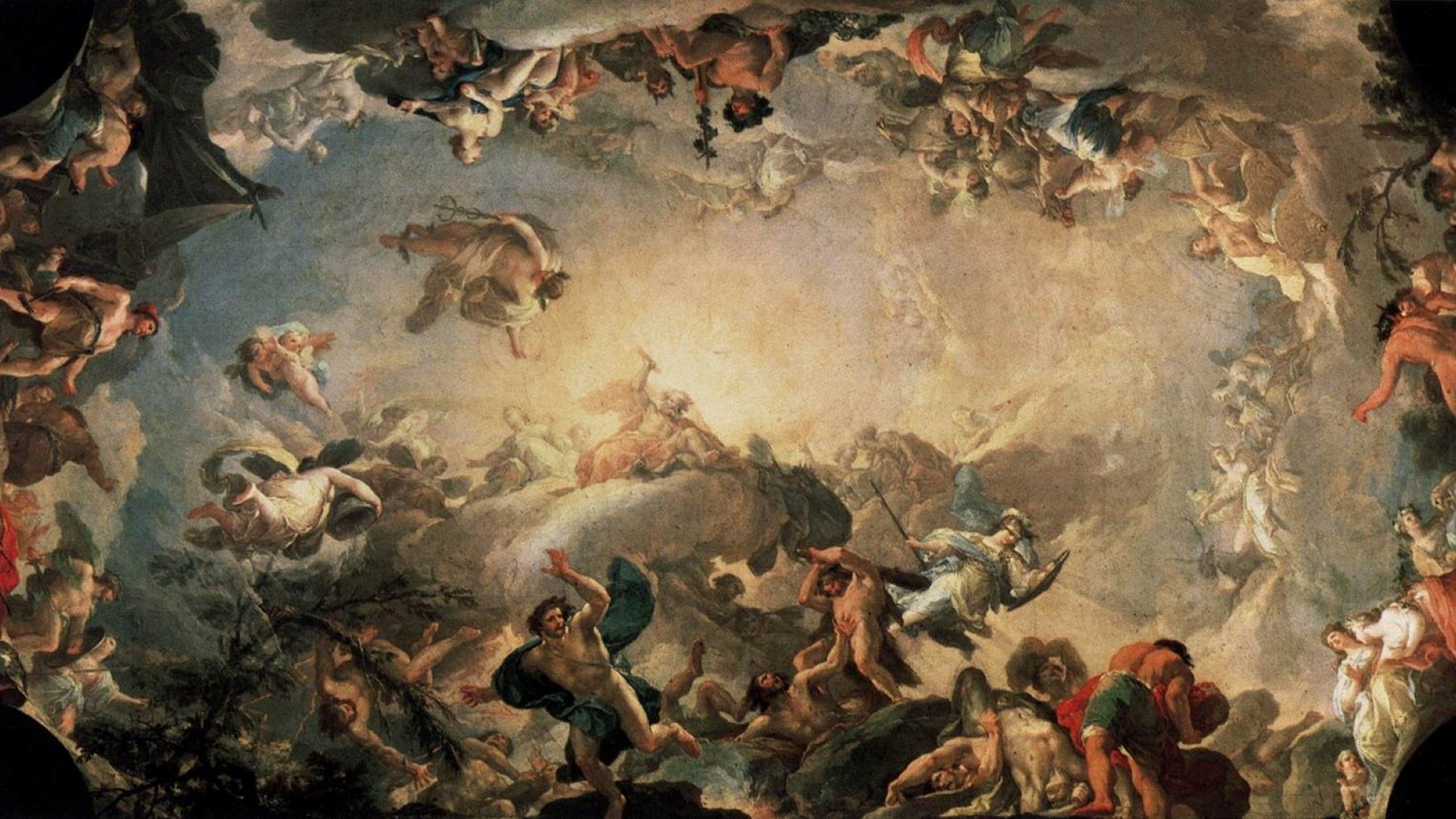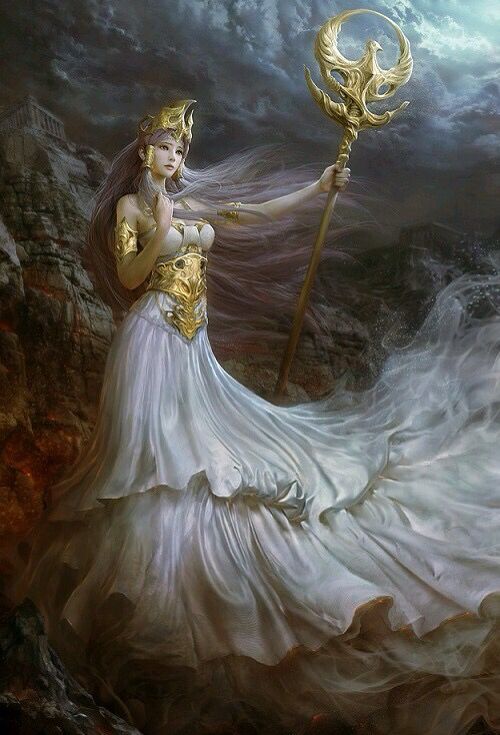
Leto

Titan goddess of modesty and kindness
Leto was titan goddess of modesty and kindness. In Hesiod's Theogony, she is described as "gentlest in all Olympus", being always gentle and mild towards others, both gods and men. However, according to various authors, she had short temper and could be wrathful and merciless to those who offended her. Her incidents with Niobe and the peasants in Lycia are the prime examples of that. The goddess is also often associated with childbirth and motherhood due to the fact that most of her myths involve the birth of her children and her close connection with them.
The hint of this to be true comes from Aelian`s On the Nature of Animals where Leto is actually connected with Eileithyia, the goddess of childbirth, because they both share Ichneumons as their sacred animal. Anyway, Leto is mostly being described as the daughter of titan couple Coeus and Phoebe, while Callimachus, Ovid and Homeric hymn to Delian Apollo are just mentioning Coeus as her father but do not say who her mother was. According to Apollodorus and Hesiod she also had a sister Asteria who plays important role for Leto giving birth to Apollo and Artemis. Her sacred place was, according to Ovid, the island of Calauria.
Impregnated by Zeus and Hera's harrasement.
As hinted above, Leto got pregnant by Zeus after the king of the gods was rejected by her sister Asteria who, according to Apollodorus and Callimachus` hymn to Delos(Asteria), threw herself into the sea to escape his embraces. Therefore Zeus turned his eyes to Leto and managed to embrace her.
Afterwards she was relentlessly pursued by Zeus' jealous wife Hera who wanted to prevent the goddess giving birth to illegitimate children. According to Callimachus, she even dispatched Ares to watch over the continent and Iris to watch the islands and threathen to all the cities and lands which Leto approached, preventing her to take refuge.
Apollodorus, Orphic hymn, Homer, Nonnus and Quintus Smyrnaeus are also mentioning Leto fleeing all over the place, while Callimachus, Homeric hymn, Hyginus and Ovid are even more specific about it.
In Callimachus' hymn to Delos(Asteria), it is being said that Leto was rejected by Arcadia, Cercyra, islands of Echinades, lands of Isthmus, Pelion, Peneus and Thessaly, while Homeric hymn to Delian Apollo is even more specific about it, mentioning Crete, Aegina, Eubea, Aegae, Eiresiae, Pepartheus, Tracian Athos, Pelion, Samos, Scyros, Phocaea, Autocane, Imbros, Lemnos, Lesbos, Chios, Mimas, Corycus, Claros, Aesagea, Mycale, Miletus, Cos, Cnidos, Cappatho, Naxos, Paros and Rheanea all rejecting her. However, according to Callimachus, the island of Cos was ready to accept her but the unborn Apollo, still inside his mother's womb was against it, saying that this island already belongs to some other Deity.
As for Ovid, he doesn't go into the details but does say that the goddess was forced to wander the three realms, Heavens, Earth and Sea because of Hera. And it just got worse. The queen also dispatched giant Tityus, offspring of Gaea, with orders to force himself on her. Instead of succeeding, the giant was then, according to Hyginus, put to death by the lightning of Zeus, while, according to Apollodorus, he was killed by Apollo and Artemis who heard their mother's cries for help. Tityus, however, wasn`t alone into pursuing Leto. Hyginus in his Fabulae also mentions Python, a snake dragon, to be trailing the goddess with the intention to kill her.
But it could not find her so abandoned the mission and returned to Mount Parnassus. It is also said that Apollo four days after his birth went there seeking vengeance and slew Python with his arrows.
Birth of Apollo and Artemis
Despite all the odds against her, Leto managed to find refuge at the island of Delos which was in fact, according to some authors, her sister Asteria. According to Callimachus, she offered her shelter despite being threathened by Hera and showed her the way at the streams of Inopus under the palm tree where she could finally rest and give birth. She was even, according to Homeric hymn to Delian Apollo, accompanied by Amphitrite, Dione, Rhea, Themis and Ichnaea. It is said that Eileithyia, goddess of childbirth, ever present at childbirth should be there but was kept in the dark by Hera at Olympus.
However, the goddesses sent out Iris to bring Eileithyia, promising her great necklace strung with golden threads. And when the goddess of childbirth finally set foot on Delos, the pains of birth seized Leto. She held to the palm tree and gave birth to Apollo. The goddess was proud to had borne a strong child and an archer, but was also exhausted. Therefore Themis helped to suckle Apollo.
According some authors, Leto also gave birth to Artemis on Delos. However there may be some contradictions regarding the place of birth for Artemis. For instance, In Homeric hymn to Delian Apollo and Orphic hymn to Leto, it is said that Artemis was born in Ortygia while Apollo was born in Delos but Ovid, although doesn`t mention anything in particular about the location, does say that Artemis and Apollo were twins born on Delos so it basically suggests it was one and the same place. Another clarification can be found looking into Hyginus` Fabulae where it is said that once Asteria was turned into island it was named Ortygia and was later cleared of waves by Poseidon and brought further up from the sea.
From that point on it was called Delos. Anyway, according to Ovid, Leto was then forced to flee Delos and came to Lycia with her children. Exhausted by travel she was looking for some fresh water when noticed a pool of crystal water in the distance where many local countrymen were gathering reeds, osiers and bulrush. She approached the pool to drink some water from it but the locals forbade her. Even worse, they started threatening her and muddied the clear water with their fithy feet and hands. It was clear that she was unwelcome and they wanted her to go away. At this point Leto became angered and raised her hands to heaven and casted a curse on the peasants to become bound to this water. And forever since then, the foolish frogs muddy their own pools, where they leap and dive.
Niobe feels the wrath of Leto
But the Lycia incident was not the only one where Leto showed her rage. Niobe often bragged that she was blessed with more children than Leto who was also forced to roam the world. All this came to an end when the goddess once heard the poisonous words of Niobe and became overwhelmed by rage. According to Ovid`s Metamorphoses, she flew to the peak of Cynthus and incited Apollo and Artemis into killing all her children. So they approached them silently and according to Apollodorus, Diodorus, Homer and Hyginus, Apollo shot down the sons, while Artemis killed the daughters. And, according to Diodrus, it all happened in the matter of seconds.
The number of her children vary. Diodorus, Ovid and Apollodorus agree that their number was seven of each, while Homer is mentioning six of each. Apollodorus even provides a comparison with Hesiod who claimed that Niobe had ten of each and with Herodotus who claimed she had two sons and three daughters. It is also said by most authors that two children were spared, one son and one daughter and for the latter Chloris is mostly mentioned to have survived. However, Diodorus and Pausanias believe that all the children had died in this slaughter. Ovid even provides more detailed story.
According to him Niobe was deterring Leto's followers from her altars, bragging that the goddess was reduced of children as if she was childless and that she was blessed for that matter. But in the end, Niobe was the one who was childless and consequently became speechless and motionless and turned into stone. A similar story is provided in Hyginus' Fabulae where it is said that Niobe in desperation went to Mount Sipylus where she was turned into stone by weeping. Afterwards her husband Amphion in revenge tried to overthrow the temple of Apollo, but was killed by the god`s arrows and was, according to Pausanias, forever being punished in Hades for being among those who mocked Leto and her children.
It is also said in Ovid's Metamorphoses that all men and women feared to incur Leto's wrath after this incident and worshiped the goddess and her children with more zeal.
Involved in Trojan war
According to Homer, Leto was also involved in Trojan war supporting Trojans alongside her children Apollo and Artemis. It is said that she opposed Hermes on the battlefield but the messenger god refused to fight her as being too dangerous to mess with those married to Zeus. So he fled and told her that she can now go and brag about how she defeated him.
Leto then picked her bow and arrows and left the scene. The goddess is also being mentioned to had healed Aeneas alongside Artemis with whom they restored the Trojan hero to his former power and magnificence.
Other myths
Leto is said, according to Ovid's Fasti, to had helped Orion to rise among stars with prayers after his death. She also, according to Hesiod, once saved Apollo from being sent into Tartarus by Zeus. It is said that she spoke kind words on his behalf and reduced his punishment. Apollo then became bound to a mortal.
[1]
Sources
Our Mobile Application
Check out Our Mobile Application "Ancient Greece Reloaded"


